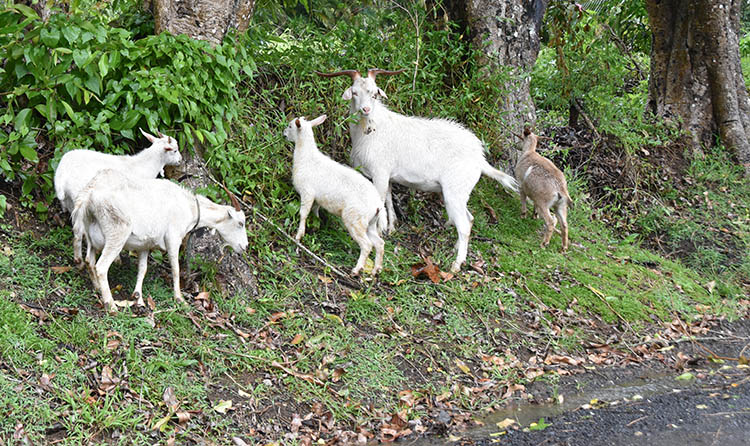Pet Talk: They’re not ‘acting’ the goat
Thursday 2 February 2023 | Written by Supplied | Published in Opinion, Pet Talk

A family of goats in Tupapa didn’t seem to mind the wet and windy weather.(PHOTO: EMMANUEL SAMOGLOU) 21081207
Whether you keep goats for meat, or for milk, which is tasty, fresh, lactose free, and nutrient rich, or for the pleasure of watching them get up to their antics, especially the kids, goats are pretty cool animals, writes Dr Michael Baer of Te Are Manu Vet Clinic.
Billy goats smell. They can be bad tempered, and they often try to head butt. They urinate on their beards, just in case they don’t smell enough. Nanny goats can be pretty aggressive too, especially when they have kids.
All goats are born escape artists, they have never seen a fence that will keep them in. Unless it is electric. All goats are nimble, so sure footed they hardly seem to pay attention to what they balance on. They can and do climb mountains and trees. All in all, goats are pretty special.
Nanny goats often have twins, and are quite hands off when it comes to parental care. They hide the kids in long grass or a bush, then go off and eat. After a bit they return and feed the kids. This has some implications for how goats are housed, without shelter to hide the kids, mum and the babies get stressed. And it’s no wonder, dogs (or wolves originally) quite like a tasty little kid. If you lose goats this way, (dogs, not wolves) report it to the Ministry of Agriculture. That is not the only reason goats need shelter. They are more heat tolerant than pigs, but goats need shade, and protection from rain. A-frames made of tin and wood work well.
Goats were desert animals, used to dry conditions. As a result, they do have certain adaptations that can be detrimental in wetter places. The first is worms. Worms don’t like the dry, their eggs dry up and don’t hatch, so animals from dry areas often struggle with the numbers of worms that survive in wet conditions. Goats are no different. Young goats especially, but adults too, can die from worms. We can help this by moving goats frequently. As the eggs are passed in poo, moving the goats, or the poo, will reduce the exposure to hatched worms. Generally it is easier for us to move the goats, but if you only have a limited amount of land, moving poo can be done.
Foot infections are the next problem for goats when it is wet. The normally hard surface of goat feet absorbs water, swells up and softens. Damage from rough ground can open cuts, letting bugs get in and cause infection. This makes the feet sore, and the goat gets lame. Some lame goats, though, are lame for human reasons. Tethers on legs can pull tight, cut in, and eventually, make the leg fall off. This is totally preventable if you tend your goats regularly. Neck tethers with a section of hose around the rope are far better.
Adaptation to dry weather also means that goats can eat just about anything. They can’t quite manage to live off timber, but they will browse on shrubs and bushes, eating woody twigs and thriving. Green feed will still make them grow better though. Part of their success is down to their capacity to use the moisture in their food. But this doesn’t mean they don’t need water! Fresh drinking water should always be available to any animal, and goats are no exception.
Whether you keep goats for meat, or for milk, which is tasty, fresh, lactose free, and nutrient rich, or for the pleasure of watching them get up to their antics, especially the kids, goats are pretty cool animals.




















































